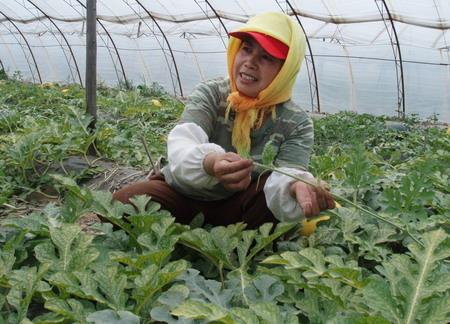
Zhou Deyi, a 45-year-old farmer from Beijing's watermelon production base of Panggezhuang in Dexing district, works in her watermelon greenhouse on May 29. [Photo / China Daily]
BEIJING - Reports of watermelons bursting from excessive amounts of a "swelling agent" have also popped the incomes of growers.
"I have been here since 9 am but sold only 10 watermelons in five hours," said Zhou Deyi, a 45-year-old farmer who has relied on her watermelon production to support the education of her two daughters.
Zhou said that last May she could sell 400 kilograms of watermelon a day on the weekends for more than 3,000 yuan ($460).
Zhou has been growing melons for more than 10 years in Panggezhuang, which for seven centuries has been Beijing's most famous watermelon production center.
While waving flags along the Beijing-Kaifeng Highway to remind passers-by of the ongoing 23rd Beijing Daxing Watermelon Festival, the waiting melon booths receive few consumers.
Not only have sales fallen, the price has dropped from 4 yuan per kg to 3 yuan per kg in less than one week, Zhou said.
"Swelling agent? I have grown watermelons for more than 10 years and had never heard about it until recently. All of a sudden it seemed every consumer was asking me about it," Zhou said.
She said the Panggezhuang area enjoys the most comfortable temperature for growing watermelons plus more sunshine than most other producing regions.
The sandy soil absorbs the heat during the day and releases it at night, which is perfect for making melons sweet, she said.
Zhou started to grow watermelons, along with peaches and sweet potatoes, in 1998 on a nearly half hectare of farmland.
Each year, she grows two batches of watermelons - one from March to June, the other from June to September. All together, Zhou said, she usually harvests around 3,000 watermelons, which she sells for more than 30,000 yuan.
"Forced ripening won't happen here because the natural environment provides the best fertilizer for the melon," she added.
In fact, to ensure the watermelon's quality and taste, Zhou and her fellow villagers even built greenhouses for the watermelon plants in 2006 with subsidies from the local government.
"Inside the greenhouse, it takes 10 more days for the watermelons to ripen," Zhou said. "But watermelons produced this way also taste better."
For fertilizer, Zhou turns to a nearby chicken farm for its organic waste, which she sometimes also shows to her customers to convince them about the quality of her watermelons.
But most of the time when consumers ask about the swelling agent, Zhou simply opens some watermelons to let them taste.
Excessive swelling agent decreases the melons' sweetness and quality, Zhou tells her customers, citing what she has heard from experts.
"Facts speak louder than words," Zhou said. "I know how my watermelons taste because I tend to their growth personally."
Nevertheless, Zhou said she expects a decline in sales of her watermelons this year, but she is not complaining much.
Last year, with the opening of subway Line 4, Zhou landed a job in a station as a cleaner with a monthly income of 1,000 yuan.
"Now growing watermelons has become my sideline," Zhou said.





